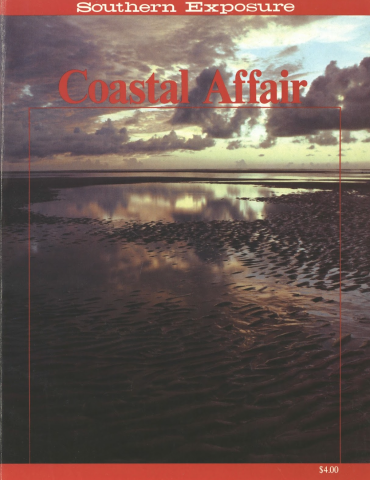Border Wars

This article originally appeared in Southern Exposure Vol. 10 No. 3, "Coastal Affair." Find more from that issue here.
From the time of the earliest European settlement in the Chesapeake Bay region, those who had the resources to acquire land did so, and those who did not looked to the water for their livelihood. The term “watermen” grew to denote the economically disadvantaged or dissident settlers who claimed some of the islands and high-ground hammocks in Bay marshes. They engaged in sporadic privateering, practiced subsistence farming and, above all, lived off the bounty of nature by fishing and hunting. For them, the Bay waters constituted a “commons,” to be exploited by anyone.
Then the competition arrived in the early 1820s. Having already depleted oyster stocks in Northern coastal waters, Yankee schooners migrated south, and by 1880 were dredging up some 17 million bushels of oysters every year, about five times the present-day yield. Shortly after this peak, with oyster populations declining, the Bay states realized their marine resources were imperiled and enacted residency laws denying access to outsiders.
Once again, the Bay became the domain of local watermen, still self-employed but now tied to a cash economy supplying local and Northern metropolitan markets built during the rampaging harvests of preceding decades. In this century the local importance of Bay watering trades has been eclipsed by new industries, tourism and recreational boating, but some important centers remain.
Smith Island, on the Virginia-Maryland border, is the best preserved remnant of this tradition. Smith shares with neighboring Tangier Island, Virginia, the distinction of having no road link with the mainland. Unlike Tangier, though, Smith has thus far resisted the summer influx of tourists which reduces Tangier’s dependence on the watering trades. The result is a pace and mood on Smith that seems to belong to an earlier time, and a detachment from organized government which breeds a cavalier attitude toward law and regulation.
“Illegal” is an everyday term in the Smith Island waterman’s vocabulary. “Tomorrow we’re going illegal scraping” (for crabs) is a fairly common statement which reflects the commonsense understanding of the need to bend inflexible regulations. Particularly irritating is the Virginia state border across the south end of their island which prohibits them from lawfully crabbing and oystering south of the line. The law is irritating only because since 1978 it has been enforced.
Friction between Maryland and Virginia over Bay resources is nothing new. Violent “oyster wars” in the 1880s resulted in a re-drawing of the state boundary, shifting it north to its present position and allowing Virginia watermen to share the valuable oyster beds of Tangier Sound with Marylanders. For the century following, Smith Islanders have ventured south of the line to dredge or scrape unlawfully when they felt it necessary for their livelihood. But with the arrival of Virginia Marine Resources Commission inspector Juney Crockett, a Tangier Island native, strict and regular enforcement of the Virginia residency law revived the border feud. Smith Island’s Tangier Sound Watermen’s Association explored methods of gaining legal access to Virginia waters and, failing to get any satisfaction or encouragement from Virginia’s Marine Resources Commission, filed suit against the state to invalidate the residency law.
Because of strong constitutional interpretations against restraints on interstate commerce, the Smith Island watermen have a good chance of winning their suit. The case may well go all the way to the U.S. Supreme Court. If the watermen prevail, there will be important ramifications both within the Bay and beyond. Not only would the Smith Islanders be able to fish Virginia waters, Virginians could harvest Maryland’s water resources, and anybody else could come into the Bay to compete with both. This has some Virginia watermen and marine resource regulators from both states worried that another round of over-exploitation may ensue.
Additionally, the residency law decision may overturn decades of selective exclusion in other states that prohibit nonresidents from freely fishing coastal waters, particularly for crabs, oysters and shrimp.* Exclusion is the simplest form of fisheries management, and open access, at least in theory, carries the specter of the over-exploitation of the most productive fisheries along the Southern coast.
There is also the possibility of the decline of the independent fishing industry throughout the South by the entry of nonresident fleets of highly mechanized craft capable of following the season from state to state and wresting control of the markets from the locals. The Smith Island watermen are betting otherwise and going full-speed ahead with their lawsuit. But regardless of who ultimately fishes these waters, the states are likely to have their work cut out for them in devising new regulatory schemes to keep this increased mobility from resulting in ravaged fisheries stocks.
*Among the Southern states only Maryland and Virginia currently have outright prohibitions against nonresident commercial fishing. North Carolina, Georgia and Alabama require reciprocity with other states before allowing nonresidents to fish their waters, thus reciprocally excluding Virginians and Marylanders. South Carolina and Mississippi, like Maryland and Virginia, lease oyster bottoms only to their residents. Texas will not lease its oyster bottoms to nonresident (i.e., out-of-state) corporations, and Louisiana allows no nonresidents either to shrimp or to oyster its state waters.
Tags
Bud Watson
Bud Watson is active in a number of Virginia conservation organizations and is also Virginia staff attorney for the Chesapeake Bay Foundation. (1982)